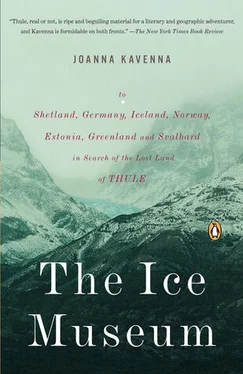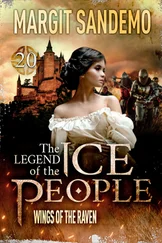At the base of the mountain, I walked to the edge of the glacier, where it declined onto the mud plains. The wind was whipping across the valley. The stones and rocks on the wet sand were shattered; some had been smashed, others sliced into neat pieces, like a cake. I crossed a fast-flowing stream and boarded the glacier at a point at which the ice had reared up, showing a rough underbelly coated in pebbles. The ice was like crystal buried under layers of rubble; I rubbed off some of the upper dirt and rocks, revealing the clearness of the ice beneath it. Clambering over a dirt pile I reached the sliding surface of the glacier, which was streaked a slate-grey. I felt a sense of a great gap—the white depths beneath the ice, and the height of the white ice towering behind me. I heard a low groaning sound from far within the ice. A river emerged from the side of the glacier: a torrent which suddenly calmed and disappeared again further down. And it was not so much fear that I felt, or any sense of pending danger, or any sense of the absolute; it was more a sense of incongruity, the sensation which suddenly hits you when you swim in deep-sea waters, and you imagine the bottomless depths far beneath your small, dangling legs. The glacier was vast and ancient, moving slowly backwards, leaving a trail of shattered rocks behind. It emitted a chill, a force field of impenetrable age. Beneath it were hidden lakes, torrents of water, and resting volcanoes.
Burton never arrived at the glacier; he only glimpsed the ice, and the view alone caused him a moment of hushed reverence, a significant volte-face. It was a dream landscape, he wrote. Beyond the long white wave, ermine above and below spotted like a Danish dog, two blue buttresses rose to the east, with a light-blue glacier spreading across the snowfields lying at the base. The sun was sinking as he watched the ice; the horizon rained light. He lurched into a last flourish, putting on his holiday baroque: ‘the opaline play of the projections and prominences which catch the lights, the faint pink-azure of the shades, and the sky-larking of the cloud-hosts over the heads of the tallest peaks, set off by the umbreous black foreground, dull and sodden, by the beggarly features of the middle distance, and by the wash of deep damascene blue at the base, fall into glorious picture; and the presence of black spots suggest the haunts of some Troll-like race—I no longer wondered that there are superstitions about this mysterious realm of eternal snow.’ Burton returned to the ship he had arrived on, steaming back to Britain, mollified by the glimpse of empty ice. At Vatnajökull, he had found something unusual, exotic in its stillness, worth the trip, worth the long crossing home. Because of this stretching silent ice, Iceland remained a Thule of sorts, thought Burton, a pure northern Arcadia, worthy of a few superstitions. The emptiness still allowed for pensive dreaming, moments of restful contemplation. It was a change of perspective: the wild weirdness of the land was less to be found in the exploding springs and the volcanoes and more in the properties of this silence, spreading across the mountains.
The ice haunted visitors, causing them to glance behind them, uncomfortable in the silence, in the empty ice-plains. The silence and the stones, the brilliant shades of the sand mountains, the swirling clouds of mist at the edges of the sea. There was grace and urgency, impressive force in the howl of gales, the rush of torrents, the roar of waterfalls, when the sea looked like cast iron, when the sky was charged with rolling clouds torn to shreds, when mists unfolded over the lowlands and when the tall peaks faded out of focus. I rested in the silence of the ice cap, loafing around at the edge for a few hours, watching a few straggling trekkers emerge along the path and stare at the ice-tongue for a while. As the evening rains began to fall onto the ice, I picked up my pack, and walked back towards the camp. Sheets of rain were slicing along the valley by the time I found my sodden bags. I stood under the canopy of the trekking centre, which had closed its doors for the evening, watching the moraine sands darken under the flood of rain.
W. H. Auden and Louis MacNeice came for the silence. They wanted nothing more, the exploding springs and volcanic eruptions hardly interested them. The poets travelled through Iceland in the 1930s, laughing quietly at the excesses of the Victorians, enjoying only the emptiness, refusing the rest. They were young—Auden was twenty-nine—kicking against the conservatism of their nation, but wary of world events, of the rise of Nazism in Germany, the biting political winds. A pair of poets, trotting delicately across the cracked plains: MacNeice in a long black raincoat and a peaked hat which he wore backwards, staring sullenly at the camera; Auden taking photographs. Auden had managed to persuade Faber to sponsor the trip, but he found himself suffering from writer’s block. He had no idea at first what he would write or how he would write it. Fortunately, he had read Byron’s Don Juan on the boat to Iceland, so he wrote letters to Byron in the style of Don Juan , his stanzas littered with hilarious rhymes. Auden and MacNeice found nothing but a thin unreal sun lighting the lava, simplicity like a spa cure. A consoling nothingness, devoid of great visions, or disconcerting signs from God, or moments of illumination.
Iceland supplied an escape from the noise of high society for Auden and MacNeice, mindful of the glare and hustle they had left. They called it ‘over-emphasis’—the insistence of the city, the backchat and the self-pity, the constant noise, the radio and traffic lights. They spent a summer in Iceland, sissies on horseback, they joked, riding across the empty land. It was a place for contemplation, for those who had forgotten the ‘necessity of the silence of the islands,’ wrote MacNeice. ‘In England one forgets—in each performing troupe/Forgets what one has lost, there is no room to stoop/And look along the ground, one cannot see the ground/For the feet of the crowd, and the lost is never found.’
They found themselves quiet in the country; MacNeice hardly spoke a word, he stood on the quay muttering Greek into his beard like a character out of Pound’s Cantos , and after a long silence he said, ‘God made the mice and the mice made the Scheiss,’ and later he said, ‘The dark lady of the Bonnets.’ The accompaniment to their escape was the distant orchestral background, the news from Europe, the pleasant voice of the wireless announcer, like a consultant surgeon: ‘Your case is hopeless. I give you six months.’ War was coming, as they rode across the lava plains, as the 1930s turned to confusion, attempts at evasion, futile appeasement.
Byron was an unlikely correspondent for a voyage out of the city, far away from the smoky rooms, the gossip and the intrigues, the milieu he loved. But Auden agreed with Byron about Romantic ecstasies in nature; he mocked the devout response to landscape, the ‘mountain snob,’ the ‘Wordsworthian fruit,’ tearing his clothes and refusing to shave his chin, wearing a pretty little boot, choosing the least comfortable inn. It was a revolt against an earlier generation, a ridiculing of earlier intensities. ‘I’m not a spoil-sport,’ Auden protested,
I WOULD NEVER WISH
TO INTERFERE WITH ANYBODY’S PLEASURES;
BY ALL MEANS CLIMB, OR HUNT, OR EVEN FISH
ALL HUMAN HEARTS HAVE UGLY LITTLE TREASURES;
BUT THINK IT TIME TO TAKE REPRESSIVE MEASURES
WHEN SOMEONE SAYS, ADOPTING THE “I KNOW” LINE
THE GOOD LIFE IS CONFINED ABOVE THE SNOW-LINE.
He was very fond of mountains, Auden protested, he liked to travel through them in a car, and he liked green plains where cattle were, and trees and rivers. Auden thought the Romantic rot had to stop; it could hardly be seen as the greatest revelation known to humanity that the sun does not go round the earth, that man is no centre of the universe. He was particularly scornful about attempts to make friends with nature, nature humility which became simpering and laughable:
Читать дальше












